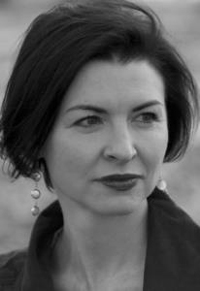 |
Isobel Dixon |
No. 100 / Junio 2017
Isobel Dixon
(1969)
Traducción de Emma Julieta Barreiro
Isobel Dixon nació en Umtata y creció en Transei, Karoo y Port Elizabeth en Sudáfrica, en donde también estudió el primer ciclo universitario de literatura inglesa en Stellenbosch en el Cabo. Después realizó posgrados en literatura y en lingüística aplicada en Edimburgo, Escocia. Desde hace más de veinte años trabaja en Londres como editora, vive en Cambridge y mantiene un activo contacto con Sudáfrica. Comenzó a escribir poesía cuando vivía en Sudáfrica. Los cuatro breves poemas aquí traducidos proceden de su quinta colección de poesía, Bearings (2016), publicada en Sudáfrica por Modjaji y en Gran Bretaña por Nine Arches.1
In Which the Capercaillie Ceilidhs On
Oh, I know where I’m going, stick with me,
though it’s going to be a bumpy ride,
fossicking, frolicking, high and low.
Lovely dark islands and all that folksy jazz
and we’ll remain, remain, remain
as one, at the very least in tune, on song.
And when we reach Oban the dram’s on me.
En el Que hay Capercaillie Ceilidhs
Ah, yo sé a dónde voy, quédate conmigo,
aunque vaya a ser un camino lleno de baches
buscando y moviéndonos, de arriba para abajo.
Preciosas islas oscuras y todo ese jazz folklórico
y nos quedaremos, quedaremos, quedaremos
como uno, al menos a tono, con la canción.
Y cuando lleguemos a Oban yo invito el trago.
In Which No Spree is Free
For a quintal of pepper you sold your sultanate,
a London freehold for champagne
and chips at Blacks. Still, what is three ducados
in the greater scheme of things?
What weight a soul, what ransoming.
The same old same old,
give it back: I’m sorry I grew tired of it.
En el Que el frenesí no es de a gratis
Por un quinto de pimienta vendiste tu sultanato,
tu pleno dominio en Londres por champán
y las papas fritas en Blacks. Pero, ¿qué son tres ducados
en el gran esquema de las cosas?
Qué pesada un alma, qué liberación.
La misma cosa vieja la misma
regrésala: lo siento me cansé de ella.
In Which Left Well Alone is Worse
Dream more, Mr Wormold. No correspondence
will be entered into here.
Crack on, crack on, there’s much to be done,
and you don’t know the half of it,
what we have left undone
and the sine qua non, the sin of omission,
that rattlesnake fact – unexamined, turning, biting back?
En el Que ser Dejado Bien Solo sale Peor
Sueña más, Sr. Wormold. Ninguna correspondencia
se meterá aquí adentro.
Anda, anda, hay mucho que hacer aquí,
y tú no sabes ni la mitad de eso,
de lo que hemos dejado sin hacer
y sobre el sine qua non, el pecado de la omisión,
ese hecho ofídico - sin examinar, regresando, ¿mordiendo de nuevo?
In Which No Fair Exchange
The rouble falls, the yen is shaken, and the bath’s
a leaky boat. The feeble rand
is rumbled yet again. Babe, I’d borrow
on the strength of our tomorrows,
but my rack-rent heart’s already mortgaged to the hilt
and the downgrade’s unavoidable. Still,
it’s better than it was – back in the which old days back when?
En el Que no hay Tipo de Cambio Justo
El rublo cae, el yen se agita, y el bath tailandés
es un barco agujereado. El débil rand sudafricano
de nuevo por los suelos. Amor, pediré prestado
para fortalecer nuestro mañana,
aunque la tasa de alquiler de mi corazón ya esté hipotecada hasta el tope
y la devaluación sea inevitable. Aún así,
ahora es mejor que antes – ¿de regreso en el que viejos tiempos regresan cuándo?
1 www.isobeldixon.com, https://newbootsandpantisocracies.wordpress.com/2016/10/22/neu-boots-are-made-for-walking-day-five-bernadette-mcaloon/


